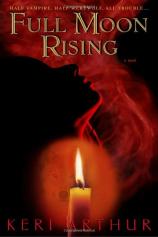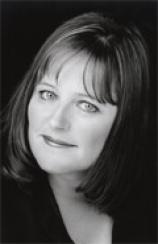Interview: February 3, 2006
February 3, 2006
Bookreporter.com's Jennifer Krieger interviewed Australian supernatural romance writer Keri Arthur, who's making her American debut with FULL MOON RISING. Arthur talks about her inspiration for this sensuous tale of intrigue and suspense, explains how she developed the concept of the Directorate --- an organization created to govern or control vampires and werewolves --- for this novel, and describes the important role that humor plays in fiction, particularly in relation to her protagonist, Riley Jenson.
Bookreporter.com: What was your inspiration for FULL MOON RISING?
Keri Arthur: The main inspiration came from an article I saw on cloning. It was discussing the pros and cons of cloning, and listed possible uses, like bringing deceased relatives back to life. Now, the thought of that is plain creepy, but it started my imagination ticking over. What if long dead grannies weren't the only source being considered by some scientists? What if there were some less ethical types who wanted to recreate some of histories more "colorful" participants. Or, more accurately, its more vicious representatives?
From there, it evolved into other questions. Such as, what if some scientists wanted to create something new? A human who was super fast, super strong, super resilient? Super intelligent? A human who could go anywhere, do anything. Be unstoppable. And what if those scientists lived in a world where vampires and werewolves and shapeshifters were real? Why would they not try to combine the best human genes with those of other races in their attempt to create their ultimate being?
My main characters developed out of these questions, basically as living examples of the perfection and potential the scientists are trying to achieve. Add in a little kidnapping, murder and mayhem, and I had a story that just sort of grew.
BRC: You delve deeply into the physical and emotional aspects of being a werewolf. Does your extensive knowledge of these creatures come from researching and reading other authors on the subject, or are the traits that separate Riley and the rest of the werewolves in the book from humans purely the work of your imagination?
KA: It's a mix of both, really. I've always enjoyed reading books on myths and legends, and I do research on the net. But most of the "rules" of my world come from a mix of imagination and commonly held beliefs.
BRC: Riley and her brother are not only not human, but they are essentially supernatural half-breeds, part werewolf and part vampire, thus they don't really "fit in" to either community. Riley feels she "does not belong." Were you drawing from any particular experience in describing her outsider status?
KA: Well, I never had that "do not belong" feeling when I was growing up, but I was something of a dreamer, and tended to live inside my own imagination a whole lot. I know as a littlie, I was always giving my parents heart attacks by wandering off (I was usually found having deep and meaningful conversations with the cows on the neighboring farm). When I was a bit older, I could often be found out the back with all sorts of plastic animals making up stories about them. So, you could say I was one step out of pace with everyone else, and while I did have lots of friends, I was still something of a loner in many ways. It's those experiences I draw on for Riley, though Riley's outsider status stems more from a rejection by others rather than real personal choice to remain apart.
BRC: Did you know when you started the novel where the plot was going to go, or did the narrative unfold as you wrote?
KA: I very rarely know where a novel is going when I start a new novel. I'm not a plotter in any way, shape or form. For me, half the fun of writing is the journey of discovery that I undertake when I create these characters and follow them on their journey. I sometimes know how I want the story to finish, but that wasn't the case for FULL MOON RISING. I actually had no intention of making it a series --- until I got about halfway through the book and realized Riley's story was a whole lot bigger than just one book.
BRC: How did you come up with the concept of the Directorate?
KA: Well, to me it made sense that if vampires and werewolves did exist, were out of the closet and living right alongside humans, the human world would make damn sure there was some sort of specialist task force to either govern them or control them. Wolves and vamps are faster and stronger than humans in my world, and just like humans, there are good, bad and those who walk the line between both. Without control, there would more than likely be chaos, so the Directorate was born. And given the human fear of those different from themselves, it also made sense that the Directorate would be given greater freedom when it came to policing supernatural creatures than regular police officers would have.
BRC: Riley expresses a kind of bemused annoyance with common "Hollywood myths" about otherworldly creatures --- such as "you can't take pictures of vampires." Does her frustration with the popular or uneducated view of supernatural creatures mirror your own?
KA: Well, some of the standard myths don't actually make much sense when you think about them. I mean, the myth of vampires not being able to see themselves in mirrors is just plain silly. How could a vampire without a reflection survive in a world that is basically full of mirrors? Look around you --- between reflective windows, glass doors, TVs, actual mirrors --- just about everywhere you look there is a refection of someone. Not having a reflection would get noticed quick smart, I think. So yeah, much of Riley's attitude about creature myths does stem from my own views on the subject.
BRC: There are aspects of the book --- especially in Riley's internal monologues and narrations --- that are very funny. Was the humor intentional? Did you set out to make Riley funny as well as sexy and dangerous, or did those character traits come to you as you began writing?
KA: I love a character who resorts to humor when the world is slapping them down --- I think it makes the character more sympathetic, and more believable. Riley's sense of humor just seemed to flow naturally as I was writing the novel. But then, I think humor is very much a normal part of everyday life. I know here in Australia, humor is often used to make a tough job more bearable or to get through tough times. I imagine it's the same the world over.
BRC: The ending, while satisfying, is incredibly suspenseful and leaves the readers hanging when it comes to the question of what role the vampire Quinn will lead in Riley's life. Is this the start of a series?
KA: Yes, it is. Riley, Rhoan, Quinn and Jack will all be back for at least another two books, and the story arc that began with FULL MOON RISING will find an end in the third book.
BRC: Did other works of supernatural fiction or authors such as Anne Rice or Bram Stoker inspire you?
KA: I know this sounds odd coming from a writer who loves all things supernatural, but I've never actually read either. The writers who inspire me don't actually come from the genre I write in --- Stephen King and James Herbert, horror writers extraordinaire, and Dick Francis, who wrote the best first person action/suspense books out there. I just love the way these three men craft a story.
BRC: Who do you read for pleasure?
KA: How much time have you got? Beside the three writers above, my favorite authors to read include David Eddings, Mecedes Lackey, Andre Norton, Anne McCaffrey, Laurell K. Hamilton and Tara K. Harper. My favorite reread authors include a couple of oldies --- Peter O'Donnell, who wrote the Modesty Blaise series (the original kick-ass heroine and still one of the best), and Alistair MacLean.
BRC: What are you working on now? What can readers expect to see from you next?
KA: I'm currently working on the fifth book in the Riley series, and a new fantasy novel about the Loch Ness monster. But next up for readers are the Full Moon follow-ups --- KISSING SIN (October 2006) and TEMPTING EVIL (July 2007).




